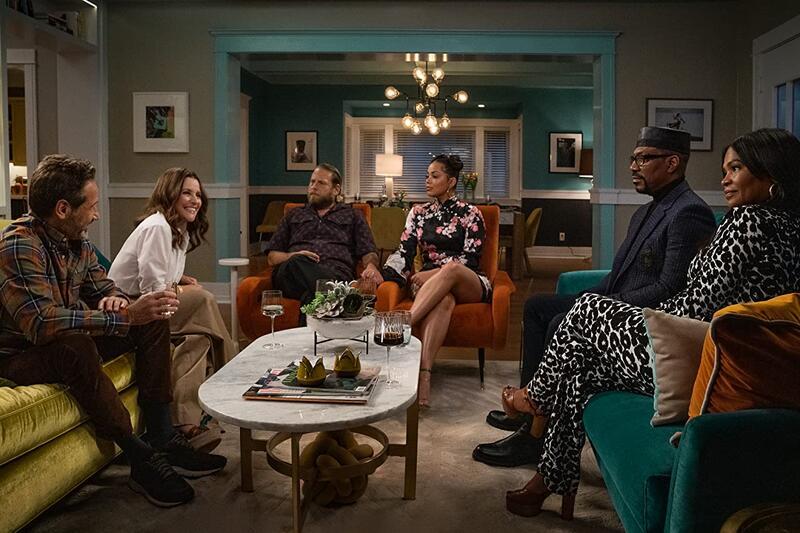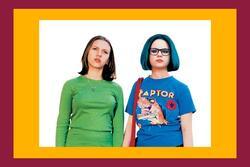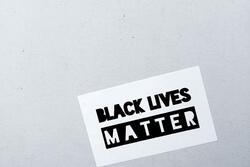"You People" Traffics in Stereotypes
By the time I was born, my Holocaust survivor grandparents had gotten over my father marrying a Black woman who wasn’t Jewish, despite their objections. Still, my mother loves to tell the story of when both sets of grandparents first came to see me in the hospital. My Buba walked up to the window of the nursery and pointed to the lone Black baby and gasped, “mine grandchild!” My Jamaican grandmother gently redirected her, pointing to me, a pale, white-appearing baby with blue eyes on the other side of the room, “Oy! Oy!” my Buba cried with delight, “mine grandchild!”
When you grow up mixed race—in my case Black and Jewish—life is full of moments like these. You learn early to have low expectations of people’s understanding of other races, and even lower ones of how folks conceive of the way different races connect to and love each other. So I wasn’t hoping for much when I sat down to watch You People, but Jonah Hill and Kenya Barris’ rom-com still managed to disappoint. Their stab at the Guess Who’s Coming to Dinner story—this time with a Jewish twist—follows the usual plot. In this case it’s Jewish boy with liberal-but-ignorant try-hard parents meets Black girl with extra-proud-Nation-of-Islam parents who are not in the market for a white devil son-in-law. You’d think with masters like Eddie Murphy and Julia Louis-Dreyfus as its stars hilarity would ensue, but by relying almost exclusively on tropes and cliches, the majority of its jokes fell flat.
The romance between Jonah Hill’s Ezra and Lauren London’s Amira isn’t grounded in much. There’s persistent product placement of Gucci and Balenciaga, as if Ezra has earned some sort of street cred with Black folks through his appreciation for and purchase of designer t-shirts and “streetwear.” The first thing that seems to bring Amira around to his advances is his admiration of her Gucci slides. Sure, Ezra loves hip hop, but what’s special or unusual about a white thirty-something year-old man with a strong affinity for rap? Hip hop has been a part of pop culture for a long time now, with once-hard rappers like Rakim and Ice Cube working as shills for Sprite and Coors Light. You don’t even have to know any Black people to know every Drake song, as Ezra does. But for this couple, hip hop is enough to cross the racial divide, and for Amira and Ezra to fall in love.
Once it’s time for the marriage proposal, we get to watch the film’s two-dimensional versions of Black and Jewish people collide. Barris and Hill have conveniently updated their cardboard cut-outs for the twenty-first century. Among a zillion other gaffes, Ezra’s mom Shelley (Julia Louis-Dreyfus) attempts to connect with Amira by boasting that she's seen the film Black Hair. Ezra’s father (David Duchovny) embarasses his son by performing an off-key version of John Legend’s R&B hit “Ordinary People,” and prattling on about the rapper Xzibit. They’re the woke kind of racists.
On the other side of the family-to-be is Amira’s father, Akbar (Eddie Murphy). He’s a contemporary caricature too: a swaggeringly, self-righteous, quasi-devout member of the Nation of Islam; an update from the pompous Christian making his moral pronouncements in pastor-ese that we see in older stereotypes. And though the young lovers cringe at their parents’ ignorance, even Ezra invites Amira’s parents to Roscoe’s Chicken and Waffles (because what else do Black people eat?) to ask for her hand in marriage.
Given that among the trio of white friends who accompany Ezra on his bachelor weekend, one was involved in the January 6 insurrection (I’m sorry, were those anti-vax Jews with guns at the Capitol?), you’d assume that Ezra doesn’t know any Black people other than his bestie and podcast co-host Mo, a Black lesbian. But a later scene where Akbar takes Ezra to a basketball court in the ‘hood begs the question of where he learned to play basketball like that, if not from playing with boys beyond the affluent white kids on his Brentwood high school team. Here we’re treated to one of many been-there-done-that moments. Akbar films Ezra on the court in order to post on social media what he assumes will be Ezra’s dismal failure. Ezra foils Akbar’s plan by showing up as the clutch white player on the Black pick-up team.
The biggest problem with You People is that whole cultures are boiled down to an oversimplified clash of classes. “Black culture” (or “the culture” as Ezra explains it when describing what his podcast is about to Akbar, winning no points) is presented as lower-class, all fried chicken in the ‘hood, sisters in wigs and weaves with RIP tattoos in their cleavage, and Crips and Bloods. And Jews, of course, are rich doctors. There’s a particularly bizarre moment when Ezra and Mo are contemplating the size of the engagement ring he bought from Tiffany’s and why it’s “so small.” We get no explanation for why a Jewish boy from a rich family—whose mother wears a predictably huge diamond—would offer his Black wife-to-be a ring that he acknowledges is less-than. To make matters worse, Ezra and Mo decide that his cover story will be that it’s his grandma’s “Holocaust ring,” reminding us, lest we forget, that whenever there’s an issue, Jews can just cry “Holocaust” and all will be excused. Barris and Hill keep pressing down on that particularly sensitive spot at the dinner where the couple introduces their parents to each other. The meal devolves quickly and predictably into an argument about Louis Farrakhan and whose “holocaust” was worse.
What we never get to see in this film is depth: depth that would probably allow it to be far funnier than it is. We never see the complexities of interracial romance in the post-George Floyd’s murder era where every educated or affluent white person at least pretends they’ve read Ibrahim X. Kendi and White Fragility, but Black people continue to have to understand white people better than they understand themselves, and to remind them that we’re not “the help.” Yes, much of the movement we think we have made toward crossing the racial divide has come from the familiarity offered by popular culture, but when two people of different races have to truly face each other and their families, Public Enemy t-shirts and Drake lyrics aren’t gonna be enough to get by.
But Hill and Barris aren’t interested in exploring how a parent moves through their fear of their child being in a relationship in which they can’t see their own culture reflected. Underneath all his stupid gotcha schemes to derail Ezra and Amira’s relationship, a three-dimensional Akbar would have a real fear of his daughter being misunderstood or disrespected by Ezra’s affluent Jewish family. There’d be a terror at the possibility of losing his daughter to the white world—a child who he raised intentionally to be as proud of her Blackness as he had to learn to be. A Shelley that was more than a cartoon would, like mothers in so many cultures, just want to kvell over her son finally falling in love and finally getting married, but might genuinely fumble in her efforts to connect to a woman she hadn’t envisioned for him and who doesn’t naturally fit into her world.
You People traffics in stereotypes of Black and Jewish people, with nothing surprising or insightful to laugh about. But Barris and Hill should remember that complex, vivid characters are funny too; their specificity allows us to see ourselves and the mistakes we make in their foibles and dilemmas. Whether we’re Black, Jewish, or any other race, You People leaves us with nothing we didn’t already know, and reinforces the tired, often dangerous lessons that we’d be wise to leave behind.








First and foremost, I went to summer camp with your dad, remember when your father married your mom, read your piece in the Forwards and thought...holy shit if I do not want to meet this woman. I live in Portland Oregon and, well, do not really expect you to write but want you to know the strangeness of our inherited past makes those of us of this Bundist legacy family of sorts. Frankly, its hard to explain the complexity of it to folks out here in the great Northwest. So thanks much. Oh, by the way, it was your dad who told my mother (who was camp mother at Hemshekh for a few summers) that I took off to go to Woodstock. I was the only one. He was not ratting on me. I think he dug the spirit. Best in all things and perhaps an exchange of posts will ensue. I would welcome it. Sincerely, Harriet
Outstanding review. My wife and I watched and could barely palate the film but knew we needed to watch to speak sufficiently about it. Thank you for putting into words where the film not only falls flat but fails Blacks and Jews - let alone romance, human frailties and strength, and the chance for growth.
I was aghast at the previews, thinking, "these are the best parts?" You beautifully articulated my suspicions.
I haven’t seen the movie but your writing is always great. Unfortunately most movies are cliches and interracial relationships are hard to navigate in the real world as well as Hollywood.
Love your view of the world my love, not everything is so simple and none of us fit into our cookie cutter stereotypes xxx